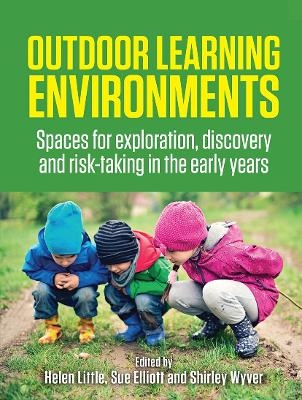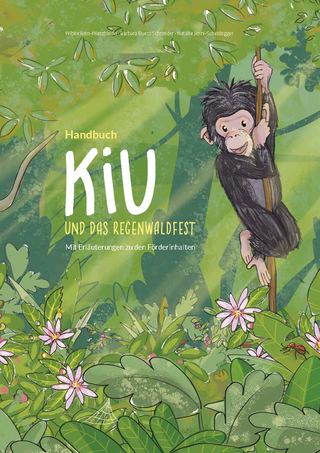
Outdoor Learning Environments
Routledge (Verlag)
978-0-367-71889-3 (ISBN)
- Titel z.Zt. nicht lieferbar
- Versandkostenfrei
- Auch auf Rechnung
- Artikel merken
Educators have a key pedagogical role in promoting early years outdoor play in natural environments. Active outdoor play involving risk-taking has been linked to positive effects on social health and behaviour, and encourages physical activity and motor skill development. At the same time, it has been recognised that opportunities for children to experience outdoor learning have been reduced in recent decades due to the impacts of technology, urbanisation and social change.
This book brings together renowned authors, with research and professional experience in a range of disciplines, to provide a comprehensive guide to developing positive and engaging outdoor learning environments in the early years. Part 1 looks at pedagogy and outdoor environments, and considers the value of risk-taking and developing a young child's appreciation of the natural world. Part 2 examines the key principles involved in the design and planning of these spaces, such as applying the relevant equipment standards and regulations. Part 3 explores how educators can develop an understanding of children's own perspectives on outdoor spaces, including promoting agency and recognising the importance of private playspaces. Part 4 examines different cultural perspectives on outdoor play, including Indigenous approaches, while Part 5 considers the range of experiences possible beyond purposefully-designed spaces, from visiting nature reserves to exploring urban environments.
'A much needed and comprehensive resource for pre-service teachers and educators of young children that encompasses philosophies, theories, pedagogy and practice for purposeful engagement of children in all kinds of outdoor spaces in Australia.'
- Dr Kumara Ward, Director of Academic Program: Early Childhood Education, Western Sydney University
'This seminal work will provide a shared language and framework for educators, policy developers, community builders and researchers in exploring the justifications for engaging children in well considered outdoor learning places and spaces.'
- Leanne Grogan, School of Education, Outdoor and Environmental Studies, La Trobe University.
Dr Helen Little is a Senior Lecturer and Early Childhood Program Director in the Department of Educational Studies, Macquarie University. She has undertaken extensive research on risk-taking in outdoor play. Dr Sue Elliott is a Senior Lecturer and Course Co-ordinator in Early Childhood Education at the University of New England. She has research interests in education for sustainability and natural outdoor playspaces. Dr Shirley Wyver is a Senior Lecturer in child development in the Department of Educational Studies, Macquarie University. Her research interests are in early play and cognitive/social development.
List of tables and figures
Contributors
1. Why do outdoor play and learning matter?
PART I: Outdoor environments as pedagogical spaces
2. Risk-taking in outdoor play: Challenges and possibilities
3. Green outdoor environments: Settings for promoting children's health and wellbeing
4. Caring for the environment: Towards sustainable futures
5. Birds and babies: A meeting of species
PART II: Designing and planning for outdoor learning
6. Planning outdoor learning environments
7. Application of standards and regulations to early years outdoor playspaces
PART III: Children's voices
8. Strengthening children's agency in outdoor learning environments
9. The private play places of childhood
10. Creating a school playground in Papua New Guinea: A participatory approach with young children
PART IV: Cultural perspectives
11. Indigenous perspectives on outdoor learning environments: On Country learning
12. Outdoor play in Norwegian and Australian early years settings: Differences in theory, pedagogy and practice
PART V: The outdoors and beyond
13. Beyond the fence: Exploring forest preschool/school approaches in Australia
14. Urban environments and outdoor learning
Acknowledgements
Index
| Erscheinungsdatum | 06.04.2021 |
|---|---|
| Verlagsort | London |
| Sprache | englisch |
| Maße | 176 x 230 mm |
| Gewicht | 710 g |
| Themenwelt | Sozialwissenschaften ► Pädagogik ► Vorschulpädagogik |
| ISBN-10 | 0-367-71889-8 / 0367718898 |
| ISBN-13 | 978-0-367-71889-3 / 9780367718893 |
| Zustand | Neuware |
| Haben Sie eine Frage zum Produkt? |
aus dem Bereich


